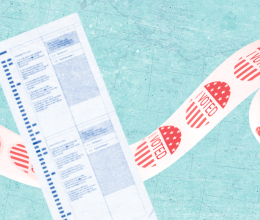Every year thousands of Ohioans with disabilities are turned away from polling precincts or dismissed at voter registration drives. Often, this is a result of stereotypes regarding their competence or intelligence.
Anyone who meets the eligibility requirements for voting can cast a ballot.
There are barriers every step of the way. Registration groups fail to send volunteers to organizations serving persons with disabilities. Poll workers may be unable or unwilling to accommodate voters with hearing or vision limitations. Voters with mobility disabilities might not even be able to physically access the building.
Physical accessibility of a polling precinct is one of the primary reasons individuals using wheelchairs may not vote in person. Parking spaces, ramps and elevators are not always compliant with the standards set in the American Disabilities Act. Precincts are often set up in older churches which may not be equipped with sufficient accessible parking, ramps or elevators. Voters in wheelchairs may cast their ballot by mail or forego voting altogether.
Barriers for voters who are deaf or hard of hearing, or have cognitive disabilities, is equally pronounced. Deaf voters find it difficult communicating with poll workers if their county’s Board of Elections fails to dispatch an American Sign Language interpreter. Additionally, voters with cognitive disabilities are frequently disenfranchised and turned away at the polls because of poll workers’ perceptions that they cannot read, interpret or understand ballot issues.
All of these assumptions and barriers serve to disenfranchise voters with disabilities. Therefore, it behooves everyone to advocate for election administration changes that make voting accessible for all voters. Moreover, voter registration efforts should target voters with special needs and encourage them to inform their BOE when they face barriers at their polling location. Though a voter registration initiative can be done any time, today begins National Disability Voter Registration Week begins, which runs through July 21.
NDVRW is a nation-wide effort to increase the political power of people with disabilities while also engaging candidates and the media to recognize the disability community. The American Association of People with Disabilities’ REV UP campaign website can connect you to NDVRW’s volunteers, organizations and communities throughout the United States offering voter education to the disability community.
Voting is one of the greatest tools to influence our democracy and it’s a right granted to every eligible citizen, despite what anyone else thinks of their abilities.
Voters should never be turned away because of assumptions about their eligibility or ability to vote. Let’s stand with persons with disabilities, challenge those who wish to disenfranchise them, and lead the charge to protect their right to vote.





